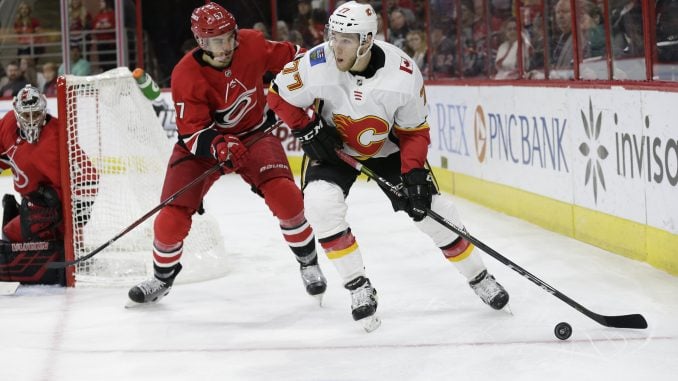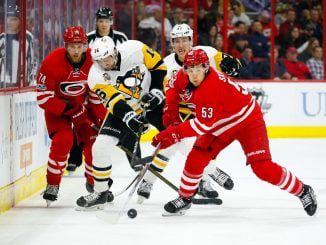
In a playoff spot and with momentum on their side, the Carolina Hurricanes enter March with a 77.82 percent chance of reaching the postseason, according to MoneyPuck.com. But as they say, that’s why they play the games. The schedule gets harder the rest of the way, and even teams that are out of the race will be calling up top prospects who want to make an impression and be considered for full-time NHL duty in 2019-20.
Without further ado, here are some items to consider as the team embarks on its first real playoff push in years.
Category 1: There’s been plenty of talk in recent seasons about how, despite the big minutes and tough competition he faces, Jaccob Slavin takes so few penalties. And rightfully so — coming into this season, Slavin had accumulated just 30 PIMs in 227 games. That’s one minor penalty per 15.1 games. Those numbers are up a bit this year — a hefty 18 PIMs in 63 games —but overall the Hurricanes’ defense continues to minimize its time spent in the penalty box.
Dougie Hamilton — who received a 10-minute misconduct late in Carolina’s win over the Kings’ Tuesday — leads the D with 46, followed by Justin Faulk’s 41. Next are Slavin and Calvin de Haan, tied with 18, followed by Brett Pesce’s 16 (just 70 for his career) and Trevor van Riemsdyk, who has only 6 PIMs in 59 games.
That’s just 145 total penalty minutes among Carolina’s regular top-six defensemen. By comparison, San Jose’s Evander Kane leads the NHL with 149, and Colorado’s Ian Cole has the most by any defenseman with 94.
Carolina spends an average of just 7:48 minutes in the penalty box per game, the seventh-fewest in the league. That’s still more than the past few years — they had the fewest in four of the past five seasons, and the second fewest in the other year — but their defense is the cornerstone of their proven discipline.
Category 2: The Hurricanes got back Jordan Staal last weekend, a welcome addition for a team that was getting throttled in the faceoff circle and, like any team, could use a shutdown center for some of the Eastern Conference’s deep-down-the-middle contenders.
The Hurricanes have limited Staal’s minutes in his first two games back — he played 13:57 in Dallas, 12:55 against the Kings — and he’s currently not part of the mix on the power play thanks to the addition of Nino Niederreiter.
He still managed three assists in the 6-1 victory over the Kings, which followed up a one-assist effort in the Dallas win. That’s four helpers in two games for a player who had six assists total in his first 29 games this season.
Staal said after Thursday’s practice that his conditioning is improving and that he’s feeling better and better which each passing day. And getting some points is the icing on the cake.
“It doesn’t hurt. Obviously, it’s a lot more enjoyable when the puck’s going in their net when you’re on the ice and contributing,” Staal said. “I’ll take it. But in general, I know when I’m at my best is doing that stuff and a lot of other things, too.”
Coach Rod Brind’Amour — who knows a thing or two about being relied on defensively above all else — agreed that the points can provide a boost, even if Staal’s contributions go beyond that.
“I think it’s big for him,” Brind’Amour said after Staal’s three-point night Tuesday. “We know how he plays; whether he’s on the score sheet or not, he’s such a valuable player. But every player wants to put up points. That how they themselves, a lot of times, view their game.”
Category 3: Speaking of the Staals, big brother Eric avoided a trade deadline relocation by signing a team-friendly two-year, $6.5 million extension with the Wild on Monday. He actually took less money ($3.25 million annually) than his current expiring deal, which paid him $10.5 million over three seasons and has seen him put up 88 goals and 96 assists for 184 points. He still has 19 games left with Minnesota this season, but he’s average 0.81 points per game over the course of the deal. If he kept the same pace the rest of the way (he projects out to being just tenths of a point shy of 200) he will have been paid $52,694.97 per point during his first three years with the Wild.
That’s a stark contrast to what Staal made on his last deal with Carolina, which paid him $57.75 million over eight seasons ($8.25 million average annual value). During the course of that deal, Staal played 520 regular season games (20 were with the Rangers at the end of the 2015-16 campaign) and had 423 points (a familiar 0.81 points).
The difference, of course, is the money. Staal earned $136,524.82 per point during that seven-year deal.
The consensus is Staal didn’t live up to his huge contract with Carolina while outperforming his deal in Minnesota. Both are probably true, but Staal certainly has proven he’s capable of long-term consistency.
Category 4: Carolina took care of business in its last 11 games, all against teams that are currently behind them in the standings, going 9-2-0 against a mix of fringe playoff contenders and bottom feeders.
March’s slate won’t be quite as kind. Starting with Friday’s home game against the Blues — who have an identical 74 points and 34-23-6 record — 12 of the Hurricanes’ next 16 games are against teams that currently have as many or more points than they do. That includes pivotal games against Pittsburgh (twice), Columbus and Montreal, plus a home-and-home with Washington later in the month.
The good news is that since the start of January, Carolina is a combined 4-2-1 against the 13 teams that currently have 74 points or more, plus they have another win over 73-point Vegas.
Category 5: Gary Bettman was in town for a standard visit to Raleigh Tuesday, which included Hurricanes owner Tom Dundon continuing to press the league for an outdoor game across the street at NC State’s Carter-Finley Stadium.
Overall, Bettman seemed pleased with Dundon’s efforts as owner in the past year, calling him “an absolute ball of energy.” And what is Bettman’s opinion on Dundon’s recent $250 million investment in the Alliance of American Football?
“I wish him good luck,” he said with a sideways glance.



